| Srl | Item |
| 1 |
ID:
127061
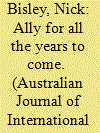

|
|
|
|
|
| Publication |
2013.
|
| Summary/Abstract |
In 2011, Australia communicated a clear choice about its strategic future. It would continue to cleave tightly to the US alliance, expand its military links and work to advance the USA's conception of regional order. Given its economic interests, why has Australia bound itself to the US alliance? What lies behind this strong commitment and what would it take for Australia to change its relationship with the USA? This article presents an analysis of the current state of the US-Australia alliance and argues that Canberra's pursuit of close relations with the USA reflects the interaction of a rational calculation of the costs and benefits of the alliance with a set of resolutely political factors that have produced the current policy setting. The article first assesses the security cost and benefit behind the alliance. It then argues that the move also derives from the strong domestic support for the US alliance, a sharpened sense that China's rise was generating regional instability that only the US primacy could manage and the realisation that the economic fallout of such a move would be minimal. It concludes with a brief reflection on what it might take to change the current policy settings.
|
|
|
|
|
|
|
|
|
|
|
|
|
|
|
|
| 2 |
ID:
148066
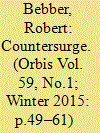

|
|
|
|
|
| Summary/Abstract |
Many experts raise concerns about the “rise of China” and the potential threat it presents to American interests. Indeed, the recent strategic pivot announced by U.S. leaders is designed to address these concerns. Yet what we are likely to see is not a rise of Chinese power, but a surge—a temporary situation of perhaps twenty to thirty years. Demographic, economic, and political factors will all combine to create a ceiling on Chinese power and ultimately cause it to decline. The United States needs to develop military capabilities that will prepare it for the coming strategic window, along with the economic and political initiatives that will enable it to influence events in the region.
|
|
|
|
|
|
|
|
|
|
|
|
|
|
|
|
| 3 |
ID:
119636
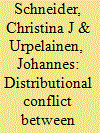

|
|
|
|
|
| Publication |
2013.
|
| Summary/Abstract |
Why do states ratify international treaties? While previous research has emphasized domestic political factors, we focus on power politics in situations in which powerful states disagree on the merits of a treaty. We argue that states supporting the status quo should discourage third parties from ratifying the treaty, whereas challenger states should entice them to do so. Based on this theory, we expect third parties' ratification decisions to be influenced by their dependence on the conflicting states. To test the theory, we use data on the conflict between the United States and the European Union over the regulation of trade in genetically modified organisms. The European Union created a new treaty, the Cartagena Protocol, to enhance biosafety regulation and propagate the "precautionary principle" over the "sound science principle" defended by the United States. Our quantitative analysis shows that ratification decisions of third parties were influenced by relations to and dependence on the clashing giants.
|
|
|
|
|
|
|
|
|
|
|
|
|
|
|
|
| 4 |
ID:
139458


|
|
|
|
|
| Summary/Abstract |
This review article summarises the literature on the relations between states and their diaspora. Policy-makers are struggling to know how best to respond to and possibly harness the potential of kindred communities abroad. The article outlines a wide spectrum of policy initiatives and categorises them into three groups: economic, political and socio-cultural. Five economic, four political and two socio-cultural factors are discussed as are a wide variety of implementation strategies evident in different jurisdictions. Though the focus is on Asia, examples have been chosen from locations worldwide. Academically, the article identifies the empirical and conceptual deficiencies in studies on diaspora strategies.
|
|
|
|
|
|
|
|
|
|
|
|
|
|
|
|
| 5 |
ID:
141797
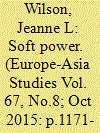

|
|
|
|
|
| Summary/Abstract |
This article compares soft power as a normative and operational construct in the Russian and Chinese political context. I examine Russian and Chinese discourse on soft power as well as the efforts of the Kremlin and Beijing to devise programmes for its implementation. I then compare and evaluate the similarities and differences in Russian and Chinese soft power strategy. The similarities between the two states indicate their joint status as authoritarian regimes with a Marxist–Leninist heritage. The differences can be attributed to their vastly disparate economic circumstances, but also to historical, social, and political factors that influence soft power policies.
|
|
|
|
|
|
|
|
|
|
|
|
|
|
|
|
| 6 |
ID:
127650


|
|
|
|
|
| Publication |
2014.
|
| Summary/Abstract |
Despite much research work on the effect of social capital or the production of social capital along ethno-linguistic or racial dimensions, there is hardly any study in this line along the much fragmented character of Indian ethnicity. This article studies the impact of ethnicity along caste and religious dimensions on the growth of social capital in the Indian context. A simple theoretical model indicates that individual ethnicity formed out of individuals' separate pairwise connections with people, who are either of the same ethnic dimension or of different ethnic dimensions, is the only factor affecting endogenous social capital growth. Empirical results suggest that all forms of individual social capital are higher for people who are of the same caste or religion. It also shows that individuals' ethnicity with the same caste or religion is the only factor influencing high performance on the productivity of aggregate social capital in general and nonstructural form of social capital in particular.
|
|
|
|
|
|
|
|
|
|
|
|
|
|
|
|
| 7 |
ID:
131002
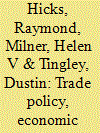

|
|
|
|
|
| Publication |
2014.
|
| Summary/Abstract |
Developing countries have increasingly opened their economies to trade. Research about trade policy in developed countries focuses on a bottom-up process by identifying economic preferences of domestic groups. We know less about developing countries. We analyze how economic and political variables influenced Costa Rican voters in a referendum on CAFTA-DR, an international trade agreement. We find little support for Stolper-Samuelson models of economic preferences, but more support for specific factor models. We also isolate the effects of political parties on the referendum, controlling for many economic factors; we document how at least one party influenced voters and this made the difference for CAFTA-DR passage. Politics, namely parties using their organizational strength to cue and frame messages for voters, influenced this important trade policy decision. Theories about trade policy need to take into account top-down political factors along with economic interests.
|
|
|
|
|
|
|
|
|
|
|
|
|
|
|
|